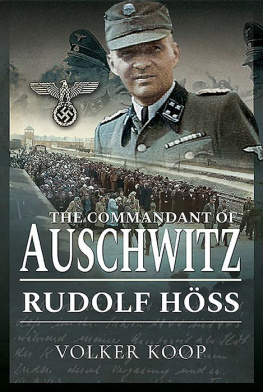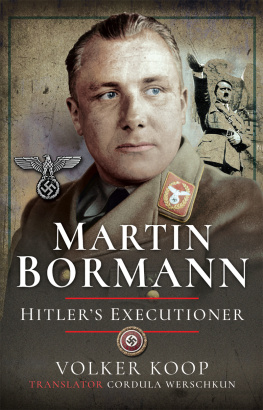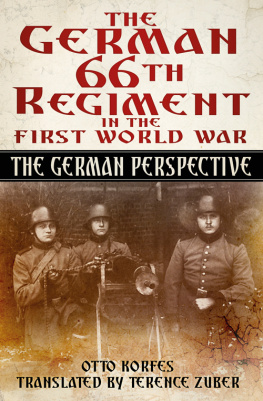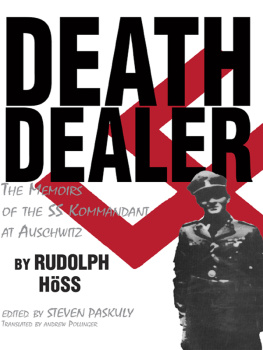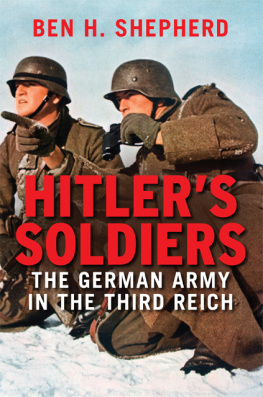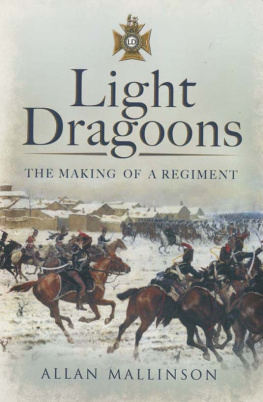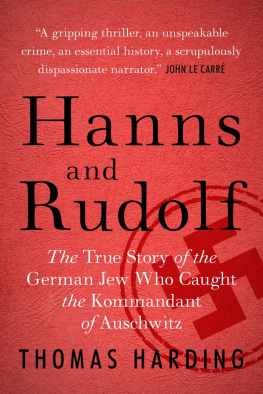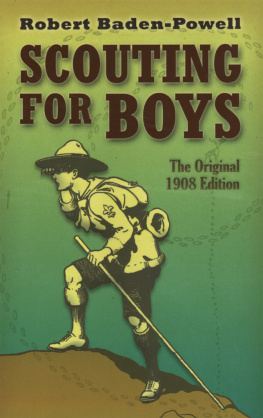Published in 2021 by Frontline Books, an imprint of Pen & Sword Books Ltd, 47 Church Street, Barnsley, S. Yorkshire, S70 2AS
www.frontline-books.com
Copyright Volker Koop 2021
The right of Volker Koop to be identified as the author of this work has been asserted by him in accordance with the Copyright, Designs and Patents Act 1988.
ISBN: 978 1 47388 688 9
eISBN: 978 1 47388 690 2
Mobi ISBN: 978 1 47388 689 6
All rights reserved. No part of this publication may be reproduced, stored in or introduced into a retrieval system, or transmitted, in any form, or by any means (electronic, mechanical, photocopying, recording or otherwise) without the prior written permission of the publisher. Any person who does any unauthorized act in relation to this publication may be liable to criminal prosecution and civil claims for damages.
CIP data records for this title are available from the British Library
For more information on our books, please visit or write to us at the above address.
Pen & Sword Books Ltd incorporates the imprints of Pen & Sword Archaeology, Atlas, Aviation, Battleground, Discovery, Family History, History, Maritime, Military, Naval, Politics, Social History, Transport, True Crime, Claymore Press, Frontline Books, Praetorian Press, Seaforth Publishing and White Owl
For a complete list of Pen and Sword titles please contact PEN & SWORD LTD 47 Church Street, Barnsley, South Yorkshire, S70 2AS, England
E-mail:
Or
PEN AND SWORD BOOKS
1950 Lawrence Rd, Havertown, PA 19083, USA
E-mail:
Introduction
R udolf H is generally considered one of the greatest mass murderers of the Third Reich. Much has been written about the commander of the death camp of Auschwitz. His willingness to speak openly and extensively about his deeds and to co-operate with the prosecuting authorities of the victorious Allied forces and also of Poland is often emphasized. This recognition is unfounded, however, for H in his mind had only done his duty as best as he could, just like many perpetrators of the National Socialist system claimed too. If his superiors foremost Reich Leader SS Heinrich Himmler had given him another task, he would have made every effort to perform this as well. As he was tasked to expand the Auschwitz concentration camp into the greatest destruction facility of human life of all time, he dedicated himself wholly to this task and showed the Nazi leadership that they could not have found anyone more suitable.
On the occasion of the trial against Adolf Eichmann in Jerusalem, the Jewish philosopher Hannah Arendt spoke of the banality of evil and called the SS Senior Storm Command Leader who organised the transports to the death camps a normal human being. In this sense H, who in his spare time tended to his family, read fairy tales to his children or went for rides, led a normal life, too. It is characteristic of him that he did not suffer from the fact of having made a crucial contribution to the death of millions of people and to have been one of the principal actors in the extermination program of the Jews ordered by Hitler and Himmler. He even dared to say with respect to the atrocities at Auschwitz that he had never condoned them and furthermore that he never personally mistreated or killed a prisoner. Perhaps this statement is partially true for his term as commander at Auschwitz there he let his SS men kill career criminals and other prisoners and do the dirty work. Yet it is also attested that he was personally involved in the trial gassing of Soviet prisoners of war in Auschwitz. Equally, in Sachsenhausen he shot the prisoner August Dieckmann by his own hand as Harry Naujoks describes.
In the isolation of his cell in Cracow in October 1946, Rudolf H wrote down from memory the regulations that applied to all concentration camps of the Third Reich and which also bound him. As purpose of the concentration camps he formulated the following:
Enemies of the State are to be prevented from their subversive activities among the population and State by secure custody in a concentration camp.
Antisocial elements which until now cause harm to the people as a whole without hindrance are to be turned back into useful people by strict education to order, cleanliness and regular work.
Incorrigible criminals who relapse again and again shall be eliminated from the German people by secure detainment.
At no point did he develop doubts that the prisoners in the concentration camps could be classified into one of the named categories enemies of the state, antisocial and incorrigible persons. The heads of the National Socialist Party, and hence in view of the equation of the state with the party also the leadership of the state, had categorised these people as such accordingly they had to be rendered innocuous, in his conviction. He did not need to ponder the legality of it. He was a recipient of orders and executioner and saw his task in protecting the German ethnic totality from such elements.
To the former prisoner Vladimir Matejka from the former Czechoslovakian Socialist Republic, who was committed to the concentration camp Sachsenhausen in November 1935, H said: You are in a concentration camp. The concentration camp is not a prison, but an educational institution with special methods. That these methods often resulted in the death of the prisoners Matejka had to painfully experience himself.
In his Autobiographic Notes , H claimed that he did not know anything of the atrocities in the concentration camps and rejected them:
I myself have never mistreated a prisoner or even killed him. I have further never tolerated mistreatments at the hands of my subordinates. If I now have to hear in the course of the investigations what awful tortures occurred in Auschwitz and also in the other camps, this sends shivers down my spine.
Of all people, these sentences were uttered by one of the greatest mass murderers of the Third Reich; of all people the commander of Auschwitz arrogated them for himself. Here H proves himself to be a liar, since in the character sketches of his subordinates he speaks very clearly of their misdeeds, even though he allegedly was unable to take steps against this as commander and camp senior:
Unconsciously I had become a cog in the great extermination machine of the Third Reich. The machine has been smashed, the motor has foundered and I have to go with it. The world demands it.
() The public may continue to see in me the bloodthirsty beast, the cruel sadist, the millionfold murderer for the masses cannot imagine the commander of Auschwitz to be otherwise. They would never understand that he had a heart, too, that he was not evil.
H implemented Himmlers instructions in a quite businesslike manner. The structure and the administration of a concentration camp, the organisation and execution of the mass murder of the Jews was for him always just the job to be done. The murder of hundreds of thousands of prisoners did not cause any moral problems for H, especially since he saw most of them not as humans anyway. Towards Jews he had this attitude without exception. H had thus internalised Himmlers demand to silence any form of sympathy while executing the mass murder of the Jews and made it his own.

